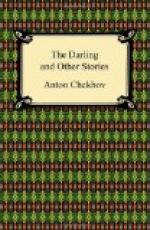“I am not going to argue with you,” said Lida, putting down the paper. “I’ve heard all that before. I will only say one thing: one cannot sit with one’s hands in one’s lap. It’s true that we are not saving humanity, and perhaps we make a great many mistakes; but we do what we can, and we are right. The highest and holiest task for a civilised being is to serve his neighbours, and we try to serve them as best we can. You don’t like it, but one can’t please every one.”
“That’s true, Lida,” said her mother—“that’s true.”
In Lida’s presence she was always a little timid, and looked at her nervously as she talked, afraid of saying something superfluous or inopportune. And she never contradicted her, but always assented: “That’s true, Lida—that’s true.”
“Teaching the peasants to read and write, books of wretched precepts and rhymes, and medical relief centres, cannot diminish either ignorance or the death-rate, just as the light from your windows cannot light up this huge garden,” said I. “You give nothing. By meddling in these people’s lives you only create new wants in them, and new demands on their labour.”
“Ach! Good heavens! But one must do something!” said Lida with vexation, and from her tone one could see that she thought my arguments worthless and despised them.
“The people must be freed from hard physical labour,” said I. “We must lighten their yoke, let them have time to breathe, that they may not spend all their lives at the stove, at the wash-tub, and in the fields, but may also have time to think of their souls, of God—may have time to develop their spiritual capacities. The highest vocation of man is spiritual activity—the perpetual search for truth and the meaning of life. Make coarse animal labour unnecessary for them, let them feel themselves free, and then you will see what a mockery these dispensaries and books are. Once a man recognises his true vocation, he can only be satisfied by religion, science, and art, and not by these trifles.”
“Free them from labour?” laughed Lida. “But is that possible?”
“Yes. Take upon yourself a share of their labour. If all of us, townspeople and country people, all without exception, would agree to divide between us the labour which mankind spends on the satisfaction of their physical needs, each of us would perhaps need to work only for two or three hours a day. Imagine that we all, rich and poor, work only for three hours a day, and the rest of our time




